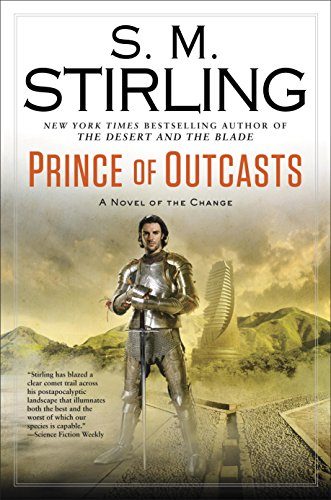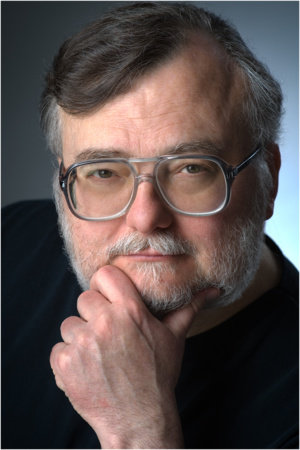“That’s why fiction is so important. It strongly affects people in ways they may not be consciously aware of at the time.” S.M. Stirling
ATLANTA, Ga. – Navigating controversies in established religions is challenging enough, hashing them out while the religious communities are still forming and creating their own identities can be downright brutal. Presently, Heathen communities have been discussing the ethics behind the barring of entry based on race, ethnicity, nationality and other similar criteria. The majority reportedly feel this is unacceptable, while a minority still posits that ties to genetic ancestors are important.

Could narrative stories help our communities examine these types of questions? Scientists are finding that we are more receptive to new ideas when they are presented within works of fiction, rather than by factual medium such as a news report. In a recent interview conducted at DragonCon, The Wild Hunt talked with author S.M. Stirling about the unconventional Heathen characters found in his Emberverse series including his newest book, The Prince of Outcasts.
The entire Emberverse series is popular with Pagans, Heathens, and polytheists, because it spells out one particiular collective fantasy: what would it be like to live in a community where our religion was dominant?
Emberverse is a work of post-apocalyptic fiction set in what was the United States. A mysterious event happens across the globe that causes electricity, gunpowder, cars, and all the things that make modern life possible stop working. As a results, 90% of the population dies off within one year due to starvation and disease. Those that survive “The Change,” as the event becomes known, band together in small, isolated groups and form new, surprising cultures. Religion, especially modern Pagan religions, are central to the series and, as such, Pagans take center stage as the heroes. Wiccans, who are the majority in the US, are also the majority of Pagans in the Emberverse. There are also Heathens, Hellenics, and polytheists of other varieties throughout the series.
Two of the main Heathen characters in Stirling’s later books fall outside of the expected character norm. Fredrick Thurston is Black; Doer Godulfson is gay. Both are leaders respected by their communities.
Thurston is the President of the United States of Boise, roughly what’s left of Idaho and a bit of the surrounding states. What makes his character so interesting is that readers are along for the ride during his conversion to Heathenry. He is religiously questing, looking for something that speaks to his spirit. A Wiccan character that he encounters notes that Thurston’s last name means ‘stone of Thor,’ and perhaps he should look in that direction for a spiritual home. Thurston does, causing him to have a direct and powerful encounter with a Heathen deity.
The book allows the character to explore, for a bit, what it means to be a Black Heathen. His experiences and devotion to the Gods, which is reciprocated, leave no doubt that Thurston has found his spiritual home. His religion strengthens him and its ethics guide him during the difficult struggles ahead as he tries to reunite his country and defeat his enemies.
![[Courtesy graphic]](https://wildhunt.org/wp-content/uploads/2016/09/640px-StirlingMapFinalC-500x318.jpg)
US after The Change [Courtesy graphic]
Stirling added that there’s nobody on earth whose ancestors were all followers of the Germanic pantheons. Like most every other modern day Heathen, Thurston’s mixed heritage means he must decide which heritage he wished to emphasize.
When asked if he has received any negative comments from readers regarding Thurston, he said, “Only comments that it was good to see someone discovering Heathenry, and Diana Paxson liked the character. I consulted her on that stuff a fair bit.”
Not only does Stirling consult with Heathens, such as Diana Paxson, to create realistic characters and not misstep on depicting the religion, Paxson actually created the the character Doer Godulfson and his best friend, Thora Garwood.
“Diana came up with them for the story she wrote for the Change anthology and I was taken with them. So I asked for her permission and she said I could use them,” said Stirling, explaining how the two characters ended up in his novels.
Godulfson is from Mist Hills, a Heathen community in what is presently southern California. He’s a sop, or what might be more commonly known as a bard. He’s as valued for his fighting skills as for his singing and ability to read runes. He’s also gay.
If you’re expecting angst over his sexual orientation, you won’t find it in Stirling’s novels. Godulfson, like Thurston, is comfortable in his own skin and steadfast in his faith. Both characters are accepted within their religious communities without incident or reservation.

SM Stirling [Courtesy]
Recently, Paxson posted her thoughts on inclusive Heathenry and the maintenance of the tribal nature of the religion, on Facebook. She wrote:
A few days ago, one of my Facebook friends quoted a paragraph by Steve McNallen in which he asked why, if it is all right for Native Americans to reserve religious practices for tribal members, it is not ok for Northern Europeans to do the same. She felt there was something wrong with that stand, but couldn’t find an argument.
I think I may have found one. Just as she was willing to listen to what Mr. McNallen had to say, I hope that those of you who identify as folkish Heathens will consider my reasoning. I welcome polite discussion.
First, a little background. During the 70s, I worked on several projects developing Career Education curriculum materials for Native American students. Our team was a mix of Native Americans and European Americans, and we field tested our materials at reservation and urban schools. Assuming that in most cases the teacher would be European, the approach I came up with was to put everyone on an equal footing by comparing how both the teacher and students’ ancestors used their available resources and technology to solve problems of housing, transportation, etc., with the way that all of us, with modern technology and resources, do today.
Like many others, at the time I was strongly attracted by tribal ways. At the pow wows I saw a number of people who clearly had a lot of European blood who were dancing and participating as accepted members of the tribe. Most of them were, or were children of, people who had “married in”, but not all. I was already married, and I did not feel called to walk “the good red road”. What I really wanted to wear to the pow wows was my own tribal garb– my medieval European gear from the SCA.
When we started field testing the curriculum I noticed a difference in how our project was received on the reservation and in the urban Indian centers. In the city, they wanted to know how much Indian blood our team members had. On the reservation, they just wanted to know whether the materials would help their children.
On the reservation the first question to ask a newcomer was “Who are you related to?” and relationship could be claimed through marriage or adoption. This reflected a long-standing tradition among many tribes, who in the old days might adopt especially courageous enemies, or even raid other tribes for people to replace lost population. The focus on blood quantum looks to me like the result of the legal requirements for tribal membership (and rights to land, lawsuit settlements and the like) established by the BIA and other government agencies. I suspect that using DNA to define identity is a Euro-American idea. While I cannot speak for Native Americans, and certainly do not mean to say that all or even any would agree with me, from the outside, it looks as if tribal identity is much more a matter of personal and cultural connection.
So if adopting genetically unrelated people who are willing to participate fully in your culture into your tribe may happen among Native Americans who are following their tribal religions, then yes, Euro-American Heathens should be able to do it as well.
Going back to the original question: can a work of fiction help communities better examine the questions and controversies that they face? Can the Emberverse series help non-Pagan or Heathen communities better understand these minority religions? And,can it help Pagans and Heathens better examine themselves?
* * *
Review: The latest book in the Emberverse series, Prince of Outcasts was released today, and takes up where the previous two books, The Golden Princess and The Desert and the Blade, leave off. The Outcasts takes place 46 years (and 12 novels) after the first book, Dies the Fire. It features Princess Órlaith, heir to a kingdom that stretches across most of the former western USA and her Knight Heuradys, who stay mostly in the former USA. While Prince John, Doer Godulfson, and Thora Garwood are lost at sea and end up near the kingdom of Capricornia in Australia. There are bad guys, a brewing war, witchcraft, battling Gods, and new cultures and religions to enjoy.
Like all the Emberverse books, The Prince of Outcasts is well-developed and the depiction of Pagan religions is well presented. It is an exceptional view of the daily life of Pagans and Heathens living among thriving communities of co-religionists. The action is enough to keep you going, but develops at a fairly leisurely pace. If you haven’t read any of the series, start with either Dies the Fire or jump to The Golden Princess.
Book: The Prince of Outcasts
Author: S.M. Stirling
Publish Date: September 6, 2016
Sample Chapters
Author’s Yahoo Group
Previous coverage of S.M. Stirling: Author’s Books Change Opinions About Paganism; Review of The Golden Princess
The Wild Hunt is not responsible for links to external content.
To join a conversation on this post:
Visit our The Wild Hunt subreddit! Point your favorite browser to https://www.reddit.com/r/The_Wild_Hunt_News/, then click “JOIN”. Make sure to click the bell, too, to be notified of new articles posted to our subreddit.
Heathen communities have been questioning the discussing the ethics Cara, while the use of both verbs is technically a fault, I suspect it captures the situation nicely.Science fiction people have been making the point about fiction showing you things that might re-direct you, for at least my lifetime. Thank you for the information about adoption practices of Native Americans.
“while a minority still posits that ties to genetic ancestors are important.”
Eh, I don’t know that many folks who think it’s not *important*. It’s just that hardly anyone but the folks you discuss above think it’s MANDATORY…
Small note, Diana’s last name is Paxson, not Paxton.
The AFA’s concept of ancestry and religion is not rooted in any organic and authentic connection to a real nationality or ancestry. It’s not about an identity defined by familial or living cultural ties to a distinct tribal grouping or some particular region of Scandinavia . “Northern European”, as used by McNallen and his ilk is really just a proxy phrase for “The White Race.”
These sound interesting. I may have to check them out.